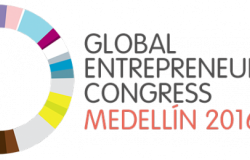A Meeting of Minds: Attending the Global Entrepreneurship Congress

This year the Global Leadership Initiative at the University of Sheffield led by Dr Chay Brooks and Prof Tim Vorley from Sheffield University Management School have taken a team of social scientists acting as policy analysts at the Global Entrepreneurship Congress (GEC) 2016 in Medellin. This is the first of what will be a series of blogs, opinion pieces and policy briefings from the summit. The team will be involved in different sessions and workshops on a range of topics from high-tech start-ups to society changing social enterprise and new policy perspectives, so watch this space for news and views from the Congress.
Since Sunday some 4000 delegates from entrepreneurial ecosystems around the world have come together to participate at the GEC. From Australia to the UK, Russia to Chile and of course the US, the event draws a truly global audience. This year in Medellin, the audience comprises policy makers in national and regional government, business support professionals and academic researchers as well as a number of prolific (and less prolific) entrepreneurs. What all of the attendees have in common is a stake in the entrepreneurial ecosystem.
The decision to host the GEC in Medellin is testament to the fact it has been recognised as one of the most entrepreneurial cities in the world. Once notorious as Pablo Escobar’s town, Medellin was a global drugs capital and one of the most dangerous cities in the world with over 32,000 murders each year. Today, as the number of murders has plummeted, the number of start-ups is increasing exponentially as Medellin has become an entrepreneurial hotspot. However, Medellin certainly remains a story of two cities, and one of the big questions attending the GEC is how entrepreneurship can provide the foundations for sustainable economic growth and societal economic development. Such questions are, however, by no means restricted to Medellin.
Advanced and emerging economies alike are looking to harness the power of entrepreneurship for change, with governments around the world extolling the importance for entrepreneurs as they seek to enhance their own entrepreneurial ecosystems. While there are common challenges associated with growing entrepreneurial economies, in terms of education and business support, beyond policy interventions some of the biggest barriers to entrepreneurial growth are cultural. In this sense the GEC is truly a meeting of minds, providing a forum to bring together leading thinkers and practitioners to exchange ideas and address these big questions.
The History of the GEC
This is the sixth Global Entrepreneurship Congress, which has played host to policymakers, practitioners and entrepreneurs from 60 nations since the first event in March 2009. The event provides a unique global forum to address the big issues in entrepreneurship policy and practice. With many of the delegates are policy makers, practitioners and stakeholders in their respective entrepreneurial ecosystems, they bear an important responsibility in empowering and enhancing entrepreneurs.
The GEC has quickly evolved into the flagship event the Global Entrepreneurship Network (GEN), and the event continues to grow. The success of the GEC, and the GEN, is contingent on drawing key thinkers and influencers to debate the challenges and future direction of entrepreneurship. Through its growing membership and evolving programme of research, policy briefing and events, the GEN has rapidly established itself as a major force in the entrepreneurial landscape and is now making its mark.
The Focus of GEC 2016
Each year the GEC addresses a number of topics and themes, in Medellin the core which will also serve as the focus of blogs, opinion pieces and policy briefs that will be produced by the GLI members. The themes include, but are not limited to:
- Entrepreneurial Cities – how can entrepreneurs enhancing the quality and performance of metropolitan areas and what can cities do to empower entrepreneurs.
- Ecosystem Metrics & Mapping – what tools are necessary to detect weak and strong points in entrepreneurial ecosystems and how should such data guide actions.
- Creating Entrepreneurial Mindsets – in what ways can entrepreneurial education be made more experiential to help foster entrepreneurial thinking and how should they be evaluated.
- Startup Accelerators – there has been a growing emphasis on rapidly scaling startups, but do the prevailing models emerging offer insights that help entrepreneurs to grow their businesses.
- Youth Entrepreneurship – despite the prevalence of entrepreneurship, youth unemployment remains a global challenge so how can entrepreneurship be promoted among millennials.
These themes are among those dominating the thinking of policy and stakeholders in entrepreneurial ecosystems around the world – entrepreneurial growth demands that these issues are addressed if countries are to realise entrepreneurial-led economic growth. Interestingly, while social entrepreneurship is on the agenda, it remains on the fringe of the core agenda. Arguably the ability to draw social entrepreneurship, and with it social innovation, into the core of the wider ecosystem will determine the entrepreneurial effectiveness of economies moving forward.
The entrepreneurial issues facing countries around the world are understandably wide ranging and are necessarily broader than can be covered, although the GEC is leading the debate on a range of pressing issues. The goal of the GEC is not to simply report on good practice, but share and exchange thinking beyond the state of the art. The commitment of attendees to the GEC is testament to the difference it can make, and provides an important focus for the GLI team from the University of Sheffield.
Dr Chay Brooks is a Lecturer in International Entrepreneurship at Sheffield University Management School (UK), and his research interests are in entrepreneurship and public policy and entrepreneurial philanthropy. Professor Tim Vorley is a Chair in Entrepreneurship at Sheffield University Management School (UK), and his research interests are in the policy and practice of entrepreneurship from an institutional perspective. The GLI Team working as policy analysts at the GEC are Winnie Liu, Dom Keogh, Elizabeth Kohorn-Hill, Ellen Peacock, Jon Harvey, and Zi Y Huang.


